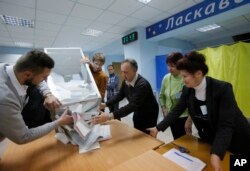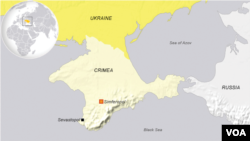Preliminary results from Sunday's local elections in Ukraine indicate growing political diversity, say analysts, as no clear winners emerged.
Opinion polls before the elections projected that Solidarity, the ruling bloc of President Petro Poroshenko, would suffer big defeats.
Poroshenko's confidence rating had dropped to 32 percent, from 69 percent a year ago, while Prime Minister Arseniy Yatsenyuk's fell even lower to 20 percent. Yatsenyuk's People's Front party decided not to field any candidates at all.
But while the Poroshenko bloc lost mayoral and council seats in the key cities of Kharkiv and Odessa, it gained seats in a majority of regional councils.
And the Opposition Bloc, made up of former allies of ousted President Viktor Yanukovich, gained some seats in the south and east, but it is not enough to pressure the ruling party into early parliamentary elections says Balazs Jarabik, a visiting scholar at Carnegie Endowment.
“That means that there is no revenge,” he says. “The voters did not empower the opposition. And, the pressure on President Poroshenko to reshuffle the government or do certain changes, or even pushing toward early (parliamentary) elections, are going to be much less than was expected before the elections.”
International election monitors declared the elections democratic, free and fair, despite localized violations and irregularities, as well as concerns about the continued influence of oligarchs on politics.
Polling was stopped in the Donesk region's port city of Mariupol as well as Krasnoarmiysk, but the votes are being re-scheduled. There was an outcry over ballots in Mariupol printed by a company of oligarch Renat Akhmetov, while Krasnoarmiysk's ballots were not delivered to polling stations.
Issues dominate vote
Stabilizing Ukraine's struggling economy and ending the fighting in the east dominated most voter concerns.
But political analysts say a lower voter turnout than expected, especially among young people, shows disillusion with the pace of reforms.
About 46 percent of eligible Ukrainian voters cast their ballots in the election, but most were middle aged or retired, says Jarabik, because younger people have less trust in politicians than their parents.
“Simply because they were expecting much more from the post-Maidan government than the government does.” He adds, “these younger generations or younger people, were expecting much more reforms, you know, better life sooner than perhaps is realistic.”
Poroshenko declared the main achievement of the election was, what he called, Russia's failed attempt to create a “fifth column” to influence Ukraine's politics.
Russian effect
Russian authorities declined to comment on Ukraine's elections.
Political analysts say Russia's actions in Ukraine have united Ukrainians to the point where no political parties declare themselves as pro-Russia.
Voting was not held in Russia-annexed Crimea nor in the Russia-backed, rebel-held areas of Donetsk and Luhansk. The rebels were to hold separate elections, but postponed them under pressure to uphold a peace deal reached in Minsk and the end-of-year deadline was extended.
The Minsk deal, agreed in February, says elections must be held in rebel areas under Ukrainian law - a prospect the rebels will not easily accept.
“Obviously, it’s also hard to imagine how the rebels would agree to have the elections under only Ukrainian jurisdiction,” says Jarabik. “So, I think the kind of compromise could be that formally Ukrainian laws and jurisdictions would be kept, but obviously rebel authorities would be dealing with the elections.”
He adds, “Now, this would be a compromise, but is not what is in the Minsk agreement.”
Ukraine on Tuesday presented a draft proposal for holding elections in Luhansk and Donetsk at a meeting of the Trilateral Contact Group in Minsk. No details were released.
The Minsk agreement calls also for two other major hurdles to overcome-decentralization of power and Ukrainian control of its border with Russia.
If Ukraine's parliament is able to pass a bill on decentralization, which, given sentiments against the Russia-backed rebels, many doubt possible, the mayors and councilors just elected are the ones who would implement it.
Run-off elections for those mayor candidates who failed to win more than half the vote are expected on November 15.






